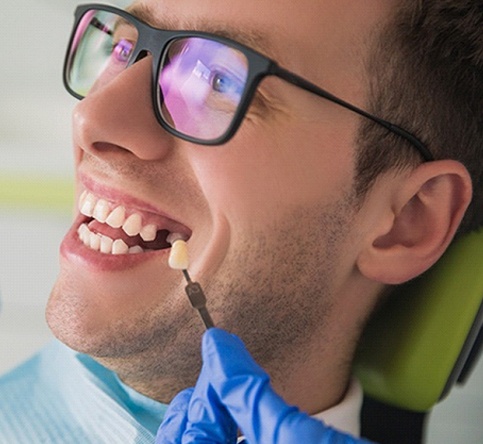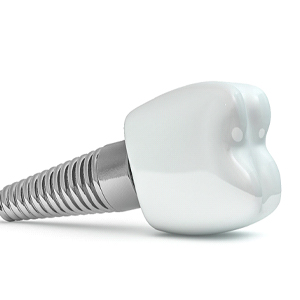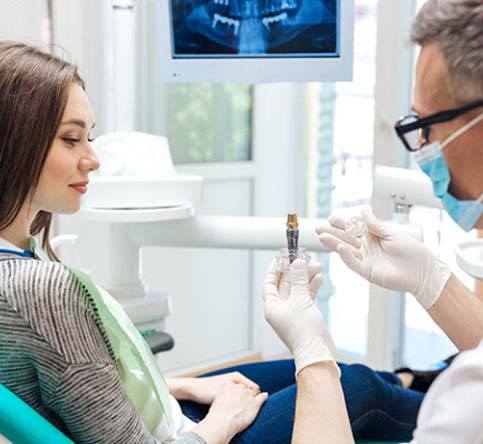Tampa, FL 33626
Office Hours
10:00am - 7:00pm
8:00am - 5:00pm
Obviously, if you had a choice, you would keep your natural teeth forever. Sadly, this isn’t always possible, but if you do end up losing a tooth, a dental implant is the next best thing. Thanks to the fact that it can replace the root of a missing tooth as well as the crown, implant-supported prosthetics resemble natural teeth as closely as possible, putting them a step above traditional forms of tooth replacement. To set up an in-person consultation to discuss tooth replacement with dental implants in Westchase, FL with Dr. Ponnaganti, please contact us today.

Dental implants, by themselves, are small posts shaped like screws. They’re normally made out of titanium, but some are composed of zirconium. In either case, they can fuse with the bone in your jaw through a process called osseointegration. After your mouth has fully recovered from this process, your implants will be able to support a restoration in order to replace any number of teeth. Unlike other forms of tooth replacement that occasionally need to be replaced, dental implants are considered permanent.

The process for getting dental implants in Westchase can take several months. Although that may seem like a long time, the stunning results are well worth it! Our team at Happy Smiles has undergone advanced training to be able to perform the entire dental implant process in one convenient location. You don’t have to worry about seeing an outside specialist! Dr. Ponnaganti and the team will be there every step of the way on your journey. While the exact process can vary from patient to patient, here’s what the four main stages of treatment will look like:

The first step on your journey towards a beautifully restored smile is a dental implant consultation with Dr. Ponnaganti. During this initial visit, she will conduct a thorough oral examination and explain your options for tooth replacement. She’ll ask about your oral health, overall health, lifestyle, and goals to determine your candidacy for treatment. Don’t be afraid to ask questions about the process – we’re more than happy to answer them for you! Once it’s decided that implants are right for you, you can begin scheduling your future appointments. Some patients may need preliminary work (i.e., bone grafting, gum disease therapy, extractions), so make sure that’s taken care of before advancing to the next step.

It may surprise you to learn that dental implant surgery is actually a fairly simple procedure. After Dr. Ponnaganti has numbed your mouth and administered sedation (if needed), she’ll make small incisions in the gum tissue to access the jawbone. The implants are inserted at precise locations and angles using advanced technology and techniques. Then, your gums are sutured shut. You may be fitted with a protective cap to protect your gums and implants throughout the healing process.

Osseointegration is a natural process that allows the implants to fuse with the surrounding tissue, providing unmatched stability and a solid foundation for your new teeth. It’s a critical part of the healing process, taking about three to six months to complete. Once fully healed, you’ll return to the office for a second minor surgery to receive your abutments. They’re small metal connector pieces that are placed on top of your implants, serving as an anchor for your final restoration (i.e., crown, bridge, or denture).

While you recover, a trusted dental lab will create your final restorations (replacement teeth) using impressions of your natural smile. Each restoration is made from materials that mimic the tooth enamel, right down to the way they reflect light. Once your new teeth are attached to your abutments, you can start enjoying the many incredible benefits of dental implants!

Did you know that according to the American Dental Association (ADA), there are more than 5 million dental implants placed each year in the United States? That’s a lot of people who are enjoying the many great benefits of dental implants in Westchase. Unmatched by any other tooth replacement solution, these permanent prosthetics offer an endless array of advantages that cannot be achieved with dentures or dental bridges. From increased jawbone stimulation and the ability to eat nutrient-rich foods that promote healthy teeth and gums, to a prosthetic that can last 30 years or longer and has a high success rate of 95%, you will not find another restorative solution quite like dental implants.




Your jaw must have an adequate amount of bone density to support implants, and your gums must be free of disease. Both of these issues can be treated before moving forward with dental implant surgery. The process itself can vary significantly depending on how many teeth need to be replaced.

As you can probably guess, one dental implant can be used to replace a single tooth. It will take a few months for the implant post to join with the bone once it has been placed in your mouth, but once it has, we can restore it with a personalized dental crown.

The advantage of using dental implants is that we can replace multiple teeth with a conservative number of posts. For example, we can use a pair of dental implants to support a dental bridge, which can be used to replace three or more teeth that were all in a row.

If you’ve lost all of your teeth, full dentures are naturally what you’ll think of first. But did you know that you don’t have to get removable false teeth? Dental implants can be used to permanently secure your dentures in place, making them more reliable and decreasing the risk of them moving at the wrong time.

Not all patients will end up paying the same amount for their replacement teeth. The cost of dental implants in Westchase can vary depending on whether you’re replacing a single tooth, multiple teeth, or an entire arch. The type of preparations required also need to be considered. We’ll be sure to have an accurate estimate for you before moving ahead with the process. Remember that getting dental implants is an investment in a beautiful new smile that will last for decades, so this treatment can actually save you money in the long run!

When you meet with your implant dentist in Westchase, Dr. Ponnaganti will look over your smile to determine whether you can schedule your dental implant surgery right away or if you need one or more preparatory procedures first. It’s not uncommon for patients to have oral health issues like jawbone loss, gum disease, or severe tooth decay that need to be addressed before getting dental implants. If that’s the case, we can plan for bone grafting, periodontal therapy, tooth extractions, and any other procedures you may require. These treatments raise your total cost of treatment, but they also ensure that your new smile has a healthy foundation.
Fortunately, Dr. Ponnaganti is capable of completing every step of the dental implant process right here in our office. This saves you the expense (and time) of having to travel to a separate practice for your surgery.

The implant posts – and the abutments that go on top of them – can be made from various materials, manufacturers, and brands. Each of these options is suitable for different cases, and our team will be sure to let you know why we’re making the specific choice that we are, as well as how it affects your final treatment costs.
The crown, bridge, or denture that we secure on top of your abutments will also have its own unique price. Generally speaking, your restoration will cost more if you require a larger number of teeth to be replaced. For example, a single crown necessitates less material, so it won’t cost as much as a full implant denture. Of course, we’ll go over this information in detail with you during your consultation.

When you look at the initial cost of dental implants, you might be skeptical that they could save you money. However, dental implants in Westchase pay for themselves several times over in the long run for a few reasons:

Not all dental insurance plans cover dental implants or the surgical procedure, but we’ll be sure to look over your policy just to make sure. In many cases, your insurance will offer some coverage for other parts of the treatment, such as your restoration or preliminary procedures. Happy Smiles is in-network with a great number of the country’s leading PPO plans, and we’re also happy to accept out-of-network plans.

Even uninsured patients can still save on dental implants when they visit Happy Smiles thanks to our other financing options:
We also offer a limited-time dental implant special in which you can get the compete procedure for as low as $199 a month! Contact us today to learn more!

Many dentists refer their patients to separate specialists for the surgical portion of dental implant treatment, which leads to increased travel times and unfamiliar settings. That’s why we’re happy to offer every stage of this transformative process right here in-office with the same team you already know and trust. This comprehensive approach is convenient and comfortable without cutting corners on quality. After your dental implant placement surgery, we’ll give you specific, detailed post-op instructions to ensure the healing process goes smoothly. Below, we’ve gathered some of the most important information to keep in mind after dental implant surgery for your convenience.

You should plan on resting for the remainder of the day after your dental implant surgery. It’s not uncommon to feel tired, especially if sedation was used. Resting is an essential part of recovering from dental implant surgery and a smooth healing process, so make sure to avoid strenuous activities for at least 24 hours. You should also avoid touching the implant site, drinking from straws, spitting forcefully, and eating solid foods.

Once the anesthetic from your dental implant surgery wears off, you’ll likely begin to feel some discomfort in the surgical site. To mitigate this, we typically recommend that patients begin their prescribed pain reliever before the anesthetic completely fades away. Intermittent bleeding, swelling, and discomfort are the three main side effects that you will most likely experience in the week following your dental implant placement surgery. They should gradually get better on their own with time, but if it feels like any of these symptoms are getting worse, don’t hesitate to contact us immediately.

In order to protect the surgical site as it heals, you should stick to a strictly soft diet. Make sure to choose nutritious items, and cold foods or drinks can help ease swelling and soreness. A few popular choices for patients to stock up on include:
As your side effects begin to ease, you can gradually begin to add crunchier, more solid foods into your diet as you feel ready to do so.

Keeping your smile clean and healthy after dental implant placement surgery is key for preventing infection and dental implant failure. A few tips you should follow include:

Overall, it takes most patients a few days to a week to recover from dental implant placement surgery. However, your jawbone will continue to heal and integrate with your dental implant for several months. Once osseointegration is complete, you’ll return to our office to have your brand-new teeth attached. At first, you may experience some gum sensitivity, but it should be mild and easily manageable. Then, you should be all set to show off your amazing new smile!

As you might know, dental implants tend to be highly successful. Their long-term success rate, in fact, is over ninety-five percent! However, they only work well when given proper care. There’s a good chance they’ll fail early without it. As such, we at Happy Smiles have listed some helpful tips on dental implant care in Westchase. Please read them over to ensure your new smile lasts a lifetime! If you’d like, you can also call our office to learn more about implant maintenance.

Implants are artificial and won’t suffer cavities, but you still need to practice good oral care. If you don’t, you might suffer gum disease or tooth infections — conditions that can cause implant failure. Therefore, always remember the following:
With these practices, your clean smile will help your implants thrive!

Implants strengthen your bite, so you can eat whatever you want with them. You’re thus free to eat a full and nutritious diet! That said, there are a few eating guidelines to consider.
For starters, you should try to lay off hard, sticky, or sugary foods. These products can cause gum infections or chip your prosthetic teeth. As you’d expect, such issues could then trigger implant failure.
If possible, focus on eating a “smile-friendly” diet instead. Foods high in protein, calcium, and vitamin C keep your jaw strong and your gum tissues healthy.

Bad oral habits affect all your teeth, not just your natural ones. In particular, they can make your implants break or fail. That being the case, play it safe and try to avoid them.
For instance, you should quit smoking. Among other things, the practice keeps implants from fusing with your jaw.
Nail-biting and ice-chewing are also not good ideas. They might damage your restorations if you aren’t careful.

While implants are strong, that doesn’t mean they’re indestructible. Play it safe, then, by wearing a mouthguard for sports and a nightguard for bruxism. That way, you can protect your prosthetic teeth from injuries and natural wear.
If you’d like, talk to our office about getting a custom-fitted nightguard. Unlike store-bought varieties, it’d fit your mouth better and keep your teeth safer. We’d be happy to set you up!

Of course, you should always attend dental checkups and cleanings. However, these visits are even more crucial when you have implants.
You see, six-month checkups let a dentist monitor your implant and spot issues early on. From there, a practice can diagnose and treat a problem before it threatens the new tooth.
Checkups also ensure your implant is cost-effective. After all, preventing its failure saves you time and money otherwise spent on a replacement.

Dental implants in Westchase are a great investment, but they are also a big commitment. Most patients have a few concerns before they are ready to agree to the treatment, but we’ll explain everything during your dental implant consultation. Here are the answers to commonly asked questions about dental implants to determine if they are right for you.
No, you can’t take out a dental implant because it replicates both the root and crown. As the only treatment to recreate the entire tooth structure, a dental implant is permanent. A titanium post will be surgically placed in your jawbone to mimic a root. Your bone will integrate with the post through a process called osseointegration. As a result, only a trained dental professional can remove it; however, some implant dentures can be taken out for easier cleaning.
Every case differs, but it’s common for dental implants to last for 30 years or more with the right aftercare, like maintaining your oral hygiene. Various factors affect their lifespan, like your oral and general health. It also depends on which teeth were replaced, such as the molars, because they undergo more wear and tear than the incisors. You can promote the longevity of your new smile by brushing, flossing, and using a daily mouthrinse. Avoid anything that may damage your dental implant, like hard/sticky foods, using your teeth as tools, or chewing on inedible objects. Don’t forget to visit your implant dentist in Westchase at least twice a year for a cleaning and checkup.
Many people worry about a painful procedure, but you won’t feel anything during your placement surgery. A local numbing agent is used along with a sedative to block pain signals. Not to mention, your jaw doesn’t have any nerve endings. You’ll be completely comfortable during your procedure, but you can expect some discomfort as the anesthetic and sedative wear off. You can manage it using any prescribed or OTC pain relievers. Your implant dentist will recommend eating soft foods to avoid discomfort. It’s also important to temperature check any foods or liquids while your mouth is still numb to avoid burns. Applying a cold compress to the outside of the face will numb the area while also reducing swelling and bruising. In 3 to 4 days, your discomfort should improve. If it worsens or doesn’t get any better, contact our office for further instructions.
Your dental implant should never feel loose. It’s a sign there’s a potentially serious problem brewing in your mouth, so you don’t want to ignore it. Your implant dentist will find the source of the looseness to provide an appropriate solution to restabilize your smile. If you wait too long to see a dentist, it can lead to dental implant failure. Contact our office right away if your dental implant feels loose, or you have pain, inflammation, and redness of the gum tissue near the post.
I Need a Dental Checkup & Cleaning I Need a Dentist for My Child I am Concerned About Bleeding Gums I Have a Cavity or Broken Tooth I am Missing One or More Teeth I am Unhappy with My Smile I Want a Straighter Smile I am Scared of the Dentist I am in Pain & Need Help I Need My Wisdom Teeth Removed View Our Services
Office Hours
10:00am - 7:00pm
8:00am - 5:00pm
Office Hours
8:00am - 5:00pm
8:00am - 5:00pm
8:00am - 5:00pm